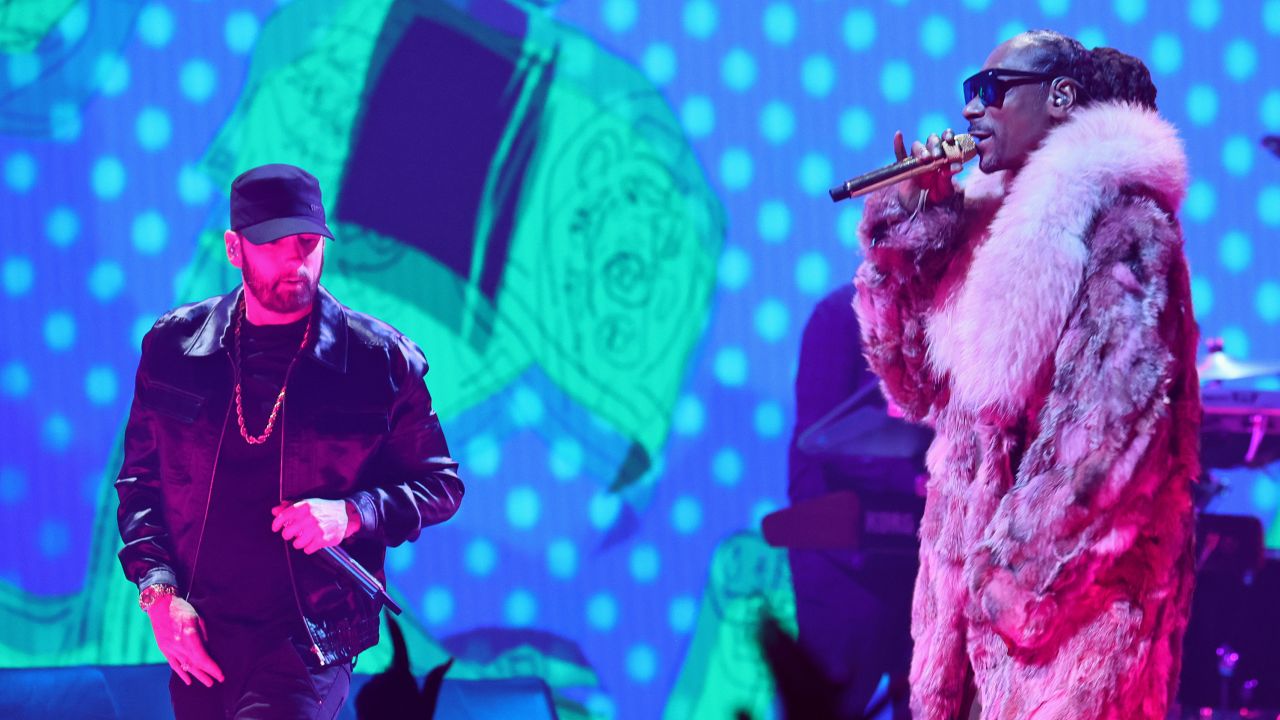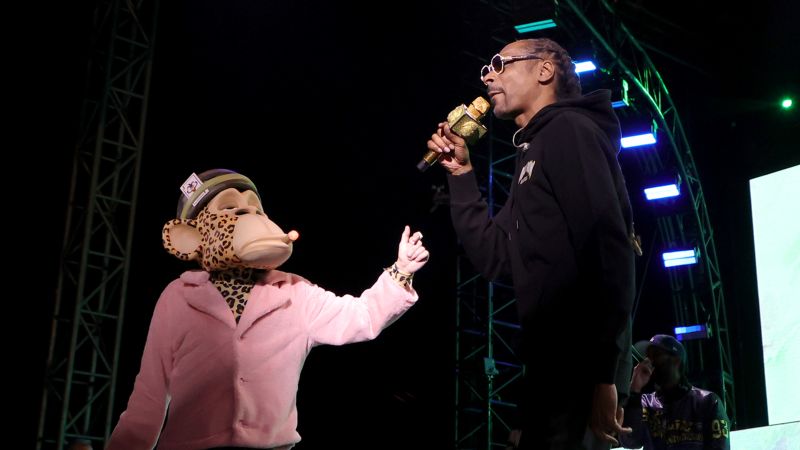The question of whether Snoop Dogg deeply and sincerely liked some cartoon apes has become key in a federal lawsuit between the crypto empire Yuga Labs and the trollish artist Ryder Ripps.
Yuga Labs v. Ripps is a fight over trademarks, but legal filings in the case are pulling back the curtain on the year of mania around the Bored Ape Yacht Club collection of non-fungible tokens (NFTs) of cartoon apes.
The Bored Apes became some of the most famous NFTs after a series of celebrities said they got one. Snoop — not a plaintiff or defendant in the case — was one of the most famous and vocal owners of an ape. But Ripps’ team says Snoop’s love of the apes was not genuine, but bought and paid for by Yuga Labs — and federal regulations require celebs to disclose paid endorsements. Court documents filed by Ripps’ lawyers claim Snoop was paid “around $1 million” to perform as a Bored Ape at the MTV Video Music Awards in 2022. The rapper did not disclose the payment in conjunction with his performance. Representatives for MTV did not respond to CNN’s questions about Snoop’s compensation for the appearance.
Celebrity-paid promos were part of the success of the broader crypto industry too, as revealed in the fallout from the collapse of FTX in November. In March, the Securities and Exchange Commission charged eight celebrities for not disclosing they were paid to promote cryptocurrencies. Further, Snoop — along with several other celebrities and crypto firms — is facing a class action lawsuit filed in December that alleges he was part of a scheme to artificially inflate the price of Bored Apes with inauthentic celebrity hype.
The rapper’s representatives did not respond to requests for comment on this story.
He told CNBC in an interview published in June last year that his interest in crypto focused on the intellectual property rights (IP) that came with it. “Being able to own and control the whole IP and not be used as a face or marketing tool or, you know, someone as an ambassador, but to actually be the owner, the CEO,” he replied when asked why he got into crypto.
Bored Apes were already a craze — with many sports and entertainment stars using them for social media profile pics and more — when Ripps copied them last year. He sold his versions as RR/BAYC with an accompanying website that detailed claims the Bored Apes contained references to racist memes on 4chan, a troll website. Yuga Labs sued Ripps not for defamation, but for trademark infringement.
Yuga didn’t have registered trademarks, so it had to argue in court that consumers associate the company with its logos and apes. It did that, in part, by pointing to the many celebrities who publicly talked about Bored Apes.
Ripps’ lawyers counter that the celebrities were paid to promote the apes without disclosing it, and therefore Yuga has “unclean hands” — a legal principle meaning that if the apes got their fame improperly, it can’t be used to assert trademark rights.
Court documents recently filed by Ripps’ lawyers state, “Snoop Dogg created a music video featuring a BAYC image and performed at the MTV Video Music Awards in a performance using a BAYC image.” The filing further alleges: “Yuga did not disclose its cash payment to Snoop Dogg for the endorsements, nor did it disclose that Snoop Dogg was a Yuga investor” in connection with the performance. Yuga Labs previously told CNN that the celebrities were not paid to promote the Bored Apes.
Guy Oseary, a Hollywood agent who sits on Yuga’s board and invested in the company, also told CNN the celebrities were not paid. But the Ripps filings say Oseary stated in a deposition “he believes Snoop Dogg was paid around $1 million for ‘financial support to do the video and performance…’”
Oseary did not respond to a request for comment on this subject. Oseary’s deposition in the Ripps case has been sealed, at the request of Yuga Labs. A few hours after the filings were posted, Ripps’ lawyers said they’d made an error in failing to redact the documents. A lawyer for Ripps told CNN he could not comment on the issue.
Yuga Labs initially declined to comment to CNN. After publication, a spokesperson sent the following statement: “Defendants Ripps and [Jeremy] Cahen included verifiably false information in their court documents based on a twisted interpretation of the facts. Yuga Labs is proud of the investors and partners who share our vision for web3. The fact is that Yuga has never paid anyone to join or promote the club, and despite all the false allegations, Yuga has never given Apes to celebrities. When our seed round took place, we publicly and proudly announced our investors — including Snoop Dogg. Our involvement in his and Eminem’s performance at the MTV VMA was well known and publicized before, during and after the show.” In a court filing posted Monday, Yuga said the description of Oseary’s statements was “incomplete and misleading,” though it did not offer contradictory statements from his deposition. Yuga also said the Snoop information poses a danger of “unfair prejudice and confusing the issues.”
John Jasnoch, a lawyer for the plaintiffs in the separate class action lawsuit, has been watching the Ripps case closely. “The recent filings in the Ripps case provide a unique insight into the web of interconnected financial interests between the entertainment industry and predatory crypto venture capital,” Jasnoch said.
Jasnoch pointed out that the sum Snoop allegedly received — around $1 million — is much more than the money paid to other celebrities who got busted for undisclosed crypto promo. Kim Kardashian was paid $250,000 to promote EthereumMax; the SEC fined her $1.26 million for not disclosing it last October. Lindsay Lohan was allegedly paid $10,000 to tweet about Tronix crypto tokens; the SEC charged her with illegally touting it without disclosure in March and ordered her to pay more than $40,000. Former NBA player Paul Pierce was paid $244,000 to promote EthereumMax; in February he agreed to pay $1.4 million for not disclosing it.
In the press release about the Pierce fine, SEC Chair Gary Gensler said, “This case is yet another reminder to celebrities: The law requires you to disclose to the public from whom and how much you are getting paid to promote investment in securities, and you can’t lie to investors when you tout a security.”
There is no indication that Snoop, whose real name is Calvin Broadus, is the target of any investigation or facing any federal accusation of wrongdoing. When CNN asked if Snoop Dogg was being investigated, the SEC issued its usual response that it would not comment on any specific case. The FTC also would not comment on a specific case. In general, an FTC spokesperson said, “if there’s a connection between an endorser and a marketer that consumers would not expect and it would affect how consumers evaluate the endorsement, that connection should be disclosed.”
The government views shilling for makeup or shoes as different from shilling for crypto. The SEC says cryptocurrency is a security -— an investment product that requires more extensive disclosures from an endorser. The SEC has not yet said whether NFTs — unique digital files bought and sold in crypto — are securities. Ripps’ team says they are, and at least one federal court has recently agreed that NFTs can be securities, depending on how they’re traded. Yuga says they’re not.
Whether NFT issuers must make SEC-required disclosures can also have serious implications for regular people trying to make a quick buck on the internet. Molly White, a Harvard fellow and a critic of the crypto industry, told CNN some firms operated under a “greater fools” strategy — that to profit from their crypto products, they needed to bring in a wider and wider audience to offload them onto. Iconic celebrities brought in the widest audience possible.

In their live/video hybrid performance at the VMAs, Snoop and Eminem morph into their Bored Apes as they rap about smoking weed and being rich. Snoop did not say he was paid, though Yuga asserted in court documents that Yuga’s name appeared in the end credits of the awards show broadcast.
When looking at whether Snoop could be in regulatory trouble, there are a few questions to keep in mind, according to Charles Whitehead, a professor of business law at Cornell Law School. “If Snoop is getting paid to promote the NFTs, then the first thing you’d have to decide is as a securities law matter, is it a security? If the answer is yes — and the SEC position has been in most of these cases, yes — then the question is, is he somehow conditioning interest in investing in securities?”
If Snoop were paid to say he’d invested in Bored Apes and they’re really cool, “That looks like it crosses the line at both the federal and the state level. … He’s got to disclose that this is a paid sponsorship and the amount that he’s getting paid,” Whitehead said.
Only dancing around as a Bored Ape, and not talking about it, “looks a lot less like an endorsement, and looks a lot less like you are promoting an investment in the security,” Whitehead said. That would be unlikely to raise SEC or FTC issues, he said. You are allowed to get paid to perform in a logo. You could ride around MTV’s stage in a little wooden wagon for Wells Fargo.
But, there’s another complicating layer. What if you’ve promoted an investment on social media — as Snoop did throughout 2022 — but you only get paid to dance around in the investment’s logo in a video? “Paid for the video but not paid for the tweets? Well, I mean, nudge nudge wink wink,” Whitehead said. “If the substance is that I’m in fact getting paid to tout the security, even if the contract says I’m only getting paid for the video — too bad, so sad. You cannot get around the law that easily.”
The overlapping lawsuits provide a window into the overlapping interests of the people involved. When Snoop got his Bored Ape in December 2021, he tweeted the image and thanked MoonPay, a crypto payments firm that says its “concierge service” allows wealthy people to buy NFTs without setting up a crypto wallet. In March 2022, Snoop invested in Yuga Labs, and the month after, he invested in MoonPay. Court documents filed by Ripps’ lawyers say Snoop also invested in Yuga as “an indirect investor through the investment fund Sound Ventures,” which is run by Guy Oseary, the Hollywood agent on Yuga’s board. Sound Ventures invested in Yuga and MoonPay. MoonPay also invested in Yuga. One of MoonPay’s crypto wallets spent $15 million on Bored Apes.
In the VMAs video, Eminem turns into a white ape wearing “hip hop clothes,” while Snoop becomes a cheetah-fur ape wearing a “pimp coat,” according to Yuga Labs’ description. Eminem rapped, “I was penniless, now I’m plenty rich. And the sh*t don’t make any sense.”
This story has been updated with a statement from Yuga and to clarify the relationship between Yuga and Snoop Dogg and other celebrity endorsers.
Read the full article here




